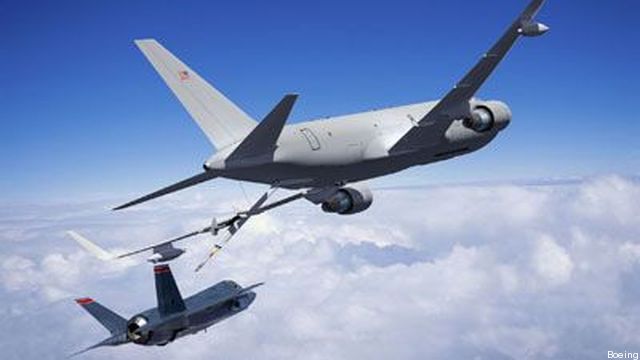
KC-46 refuels F-35; artists rendering
It began in low voices behind closed doors but some days ago the battle for US military aid turned to open war.
The first skirmish is being fought over the Israeli Air Force’s (IAF) advanced aerial refueling aircraft meant to replace its aging converted Boeing 707s.
Until some months ago there were two options on the table: the Boeing KC-46A and Israel Aerospace Industries (IAI) converted Boeing 767s. IAI was confident that its offer would be evaluated seriously, especially in light of the delays to the KC-46. But this confidence was destroyed when IAI learned that the IAF is locked on buying the KC-46A.
IAI was shocked, but the they initially kept their reaction behind closed doors. This changed when I met with Joseph Weiss, president and CEO of IAI in his office. Weiss spelled out all his anger and frustration when i asked him if the company is in the competition for the new aerial refueling aircraft
“We are not. We have not been given a chance to compete in spite of the fact that we can supply the best cost-effective solution. It is very strange that the Israeli air force ignores our proposal. The Ministry of Defense has not even begun a dialogue with us on our proposal. That is wrong, very wrong. We only ask for a fair chance to compete.”
Weiss will soon end his term as president and CEO of Israel’s largest aerospace industry, and it was obvious that he felt more free to go public.
IAI has been offering converted 767s for special missions, including aerial refueling, for years. In 2010, the Bedek division of IAI delivered a converted B767-200ER (Extended Range) to the Colombian Air Force (CAF). The aircraft was converted to a Multi-Mission Tanker Transport (MMTT) configuration for the Colombian government and the end-user, the Colombian Air Force.
According to IAI, its 767 conversion offers four possible options for the air refueling capability: flying boom; hose & drogue; hose & drogue and three points combi-hose & drogue plus flying boom, and Fly-By-Wire (FBW) Boom, Remote Aerial Refueling Operator (RARO) station and upgraded avionics.
Sources that asked not to be identified say that the KC-46 A is the optimal solution for the IAF.
This frontal attack by Weiss reflects a wider concern among the Israeli defense and aerospace companies. These companies say that the diminishing percent of the FMF grants that can be exchanged to Israeli Shekels , will hit them in the worst spot. “The fact that U.S dollars will be available and less local currency, will force the Ministry of Defense to buy almost only U.S-made systems. This is the direct effect but not a less crucial one is the decreasing R&D budget that this situation will cause,” says Weiss.
Israel has been for many years the largest recipient of U.S. foreign assistance since World War II. In the last 10 years the U.S foreign military funding (FMF) to Israel totaled $31 billion. With the new FMF Memorandum of Understanding , the sum the government will have to buy from Israeli companies will decrease gradually and vanish in 2024.
The companies fear that without that money, the Ministry of Defense buy directly from U.S companies. That will harm the local defense industries and force them to lay off employees, slash R&D budgets and further reduce their ability to compete with the American manufacturer.
Some observers, including opponents of U.S. aid to Israel, argue that U.S. assistance to Israel supports Israeli arms purchases without providing sufficient scrutiny of controversial Israeli military actions.
While Weiss targets the tanker program, other Israeli companies have started to get ready to cope with the new situation.
Some, like Elbit Systems, have very active U.S subsidiaries. Others like IAI have US subsidiaries but, so far, they have not proven their ability to compensate for the new reality.
A few months ago IAI said that it is changing its activity pattern in the U.S market to better deal with the changing conditions and especially with the new Foreign Military Financing (FMF) agreement with the U.S. “We are reorganizing our activities in the U.S to be ready for the changes in the market,” Weiss told me.
 IAI currently operates in the U.S through its local companies, IAI North America, Stark Aerospace and ELTA U.S. “We are in the process of building a new strategy for our operations in the U.S. It will be based on proxy companies that will have U.S boards and will act separately from our other activities,” Weiss said.
IAI currently operates in the U.S through its local companies, IAI North America, Stark Aerospace and ELTA U.S. “We are in the process of building a new strategy for our operations in the U.S. It will be based on proxy companies that will have U.S boards and will act separately from our other activities,” Weiss said.
He added that IAI is now evaluating some opportunities to purchase local American companies that could serve as “proxy” companies to allow IAI to increase its sales in the U.S market.
Now with the aerial refueling deal slipping out of IAI’s hands, the other Israeli companies are beginning to understand just how tough the new reality is going to be.
Efforts to get comment from the Defense Ministry and IAF met with standard responses: “The process is still on. No official decision has been made.”
Lockheed Martin projects potential $1 billion loss on classified program
Lockheed CFO Jay Malave said the company currently expects the program to become profitable on an annual basis around the 2028 timeframe.


























